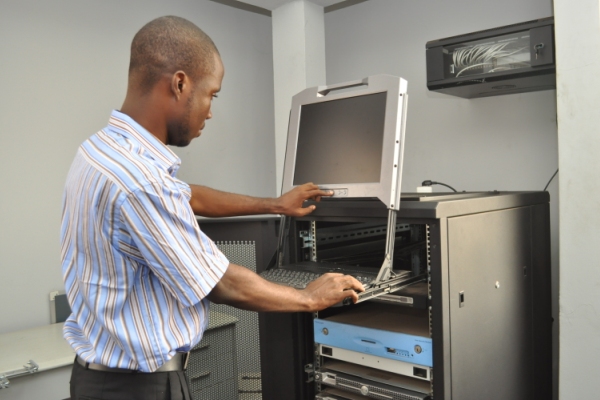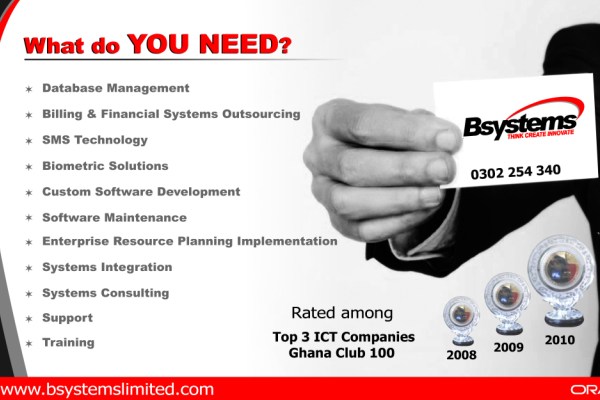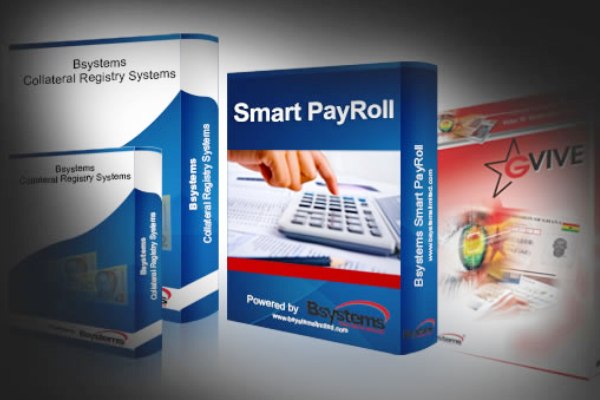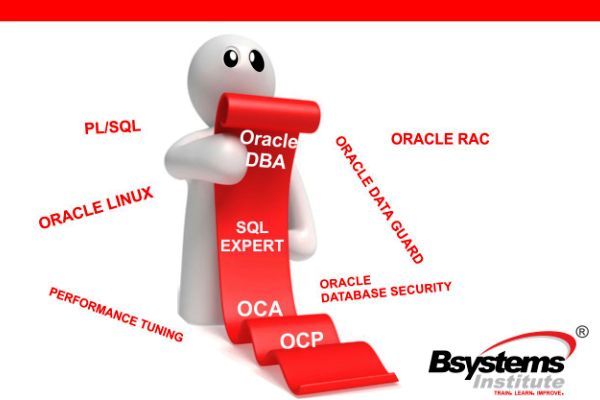Bsystems Limited: IT-Based Business Solutions in Ghana
Thomas A. Baafi talks about the IT sector in Ghana and presents his company and their main solutions. Bsystems Limited is a software and database management company offering IT-based business solutions within the sub-Saharan region.
Interview with Thomas A. Baafi, CEO of Bsystems Limited
What is your assessment of the IT sector here in Ghana? Would you say that the IT sector here is ahead of others in the region?
This solution that we have implemented successfully in Ghana is applicable to many other African countries. So once we have finished implementing the verification system in Nigeria we shall start to take it to other countries.
It depends on the specific sector, I would say that in terms of the software industry Ghana is probably at the forefront whilst for example in terms of hardware solutions I think that Nigeria is doing very well. When it comes to software development, Ghana is ahead of the rest of the West African countries. When it comes to broadband technology and developing mobile apps, etc. I think that in Ghana we are at the forefront in the region. Nigeria is also doing very well but overall I think that you will find that most of the applications that have been developed in Ghana are used all over West Africa and in many other countries also.
Can you give us an example of this?
For example most of the mobile applications for the banking sector where people can check their balances and makes transfers from one account to another, etc. directly from their mobile phone were successfully created by IT companies here in Ghana.
You founded your company in 1989, so you have many years of experience in this field, I believe you began in data management, is this still the main area that you specialise in?

Initially we wanted to do Oracle ERP implementation for the financial services sector but when we came to it we realised that most of the companies here were not ready for it because it would be very expensive and most companies were not ready to invest that kind of money. So what I decided to do was to develop simplified solutions based on the Oracle technology for most of the SMEs in the market place. We developed a solution for HR payroll, salary administration, asset management, etc. basically a slimmed down version of some of these applications that would be easier to install and then to sell, because most of the applications that we wanted to implement in Ghana were costing over 100,000 to 2 million. We realised that a lot of the companies could not afford that, so we developed our own solutions that the Ghanaian companies could afford. From the database management experience that we started with, we realised that not all companies could afford these expensive solutions so we went ahead and developed some simplified and more affordable applications.
After that development we looked at specific problem areas by talking to the different banks and asking them what they wanted us to develop certain applications for. We tried to find out what the common problems that all these banks in all the different areas were facing. For example, these banks told us that they wanted us to develop a cheque request management systems for them. In most of the banks if you request a cheque, you often go to the bank and are told that the cheque is not ready, but in fact it has already been printed. We put in a workflow system for the banks so that when you go into the bank and request a cheque, the bank can find out exactly where that cheque is at any time, whether it is at the printer or whether it is at another branch, etc.
We also developed an application for salary administration so that a company can submit their salary information to the bank without leaving the office and the banks can quickly take that data and load up the salaries.
We started with one idea and picked up new ideas; in certain areas we saw that some companies were not ready for certain solutions so we developed solutions to suit them. That is how we have managed to get all of these applications into the market place.
Is developing applications still the main area of your activities? What other areas do you work in?
Yes developing applications is the main area of our business´s activities. One area that we realised from the onset was in demand from most of the banks was improved identity verification. In Ghana there are various forms of ID: we have drivers´ licenses, voters IDs, national ID, national health insurance ID, etc. but a lot of the banks could not verify identification very well because a lot of people were bringing in fake IDs. So we went into collaboration with the Electoral Commission who gave us the identity data in order to design a solution for all the banks to be able to verify that information. A lot of the banks were having to go to the Electoral Commission to verify these IDs, but obviously the Electoral Commission had to tell them that they are not in the business of identity verification. Thus we collaborated with the Commission and created a solution for the banks. In using the voters ID verification we have also managed to integrate passport verification and we are now in the process of bringing in verification of the drivers´ licenses and the national health insurance IDs and of all of the other forms of ID. Therefore, no matter what form of ID you have, you should be able to verify that ID when you go to open an account. Now all of the commercial banks are connected to our verification system. That has been one of our biggest achievements; we have over 25 institutions connected to our system.
You have really found a niche for your technology here in Ghana, have you started to go abroad with this technology?
We saw a tender in a Nigerian newspaper for a company that can offer verification. We partnered with a company in Nigeria and we submitted our tender and have been awarded a contract, which we are yet to start.
This solution that we have implemented successfully in Ghana is applicable to many other African countries. So once we have finished implementing the verification system in Nigeria we shall start to take it to other countries. This application deals with a portal and that portal will have all forms of ID on it which means that no matter what form of ID you bring to it, we believe we can verify it. This will make the application very robust and internationalized. Every country in Africa will need such a solution to help their industry.

Has this system not been developed already outside of Africa? Are there no other large software companies offering this software?
This is a niche area just like you said earlier. Most solutions are developed because of specific problem areas, so if you look at Europe you don’t find anybody with 2 forms of ID, for example a real voters ID and also another one but with the name changed, however here in Africa you do see people with various IDs and it is a real problem here.
I imagine that this happens a lot in Asia or in South America for example, no one else is offering this software?
Not that I know of. I don’t think that the problem is as acute in other countries; I don’t think people in other countries use fake IDs as much to do business. Whereas in some African countries people have lots of fake IDs. It is these fake IDs that are really spurring the need for these applications. We now hear about people in the USA having double identities so we will be able to sell this kind of solution everywhere. I have never seen any application like this anywhere else. I think that in most other areas people don’t use fake IDs for fear of being caught, but here people do use them and they carry out transactions with them. That is why this solution has been developed in this specific area and people are now willing to pay for this verification system.
What other areas are you developing with your company?
We have now developed a solution for the Bank of Ghana called the Collateral Registry and this specific software is also available for the banking sector. For example, in Ghana someone could take a moveable item like a car and go to a bank and get a loan, they could then take this same car to another bank and get another loan. The same thing could happen with the title of a house. If the person defaults on the loan, how do you sell that specific item? How do you go about it? In 2008 there was a law in Ghana called the Lenders and Borrowers Act, and the IFC via the World Bank gave Ghana money to develop this kind of secure transaction system and we won the contract to develop this solution for the Bank of Ghana. This solution has been really good for Ghana because it is now also actually helping the banking industry to give loans to people because if you bring your car or your house to the bank we can now tie that asset to you so that you can’t go to another bank to get another loan with that asset and so the banks´ confidence in people´s assets is greatly increased.
Is that replicable everywhere else?

Yes indeed. We have also been awarded a contract from the World Bank to implement this for the Central Bank of Liberia. We believe that by working with the World Bank we should be able to get this software all across Africa.
What are the challenges that you face at the moment as a company?
Right now one of our challenges is resources, because we already have different types of technologies that we can use to develop faster applications. We have people who are very good in programming which is key when taking on any problem that you want to develop a solution for. Normally it takes between two and three years to develop a very good, robust application. You need financing for that, but most people in Ghana can´t finance a software project because it takes two to three years just to develop the product yet alone the time it then takes to market it and find someone to buy it. The banks here do not finance software development because they fear that at the end of the day you might not even sell the product and they won’t get their money back. Therefore getting the right financing is a real challenge. Furthermore getting the customers to buy the product is another challenge because sometimes they want to have references of other clients already using the product before they go ahead and purchase it. These are some of the challenges that we face as a company.
When it comes to programming, sometimes we bring in very good students from the universities and we train them up but this is a long and costly process. If you don’t have very deep pockets there is no way that you can take on any huge projects that are applicable to Ghana. There is a lot of software out there but if you want to bring it to Ghana you have to do a lot of customization and sometimes you also need the foreign partners to stay here to support it. We often say to outside programmers, “why don’t you give us the solution, we can develop it and let´s support it”, because the people who developed it are here. Then we can export the software to West Africa because the distances here are very short, for example to travel from here to Liberia or Nigeria, etc.
Therefore you import software, adapt and customize it and sell and export it in the region. As you say, financing here is very difficult; the banks have ridiculously high interest rates and so basically it means that you have to invest your own money because you can’t borrow money from a foreign bank.
Financing here is a different process, most of the banks do short term financing and they don’t do long term financing. So if you are developing software which take two or three years to develop a very good application, how do you finance it if you don’t have the kind of money that it requires?
Can you tell us more about other products that you have developed?
Well there is a software solution which is the human resources and payroll software which we developed in Ghana and which we have sold to a lot of the insurance companies and some of the banking sector. Everything for that HR payroll application has been localized, for example If you want to bring the Oracle HR payroll system here you still have to have someone who can rewrite the entire application, to localize it to take the Ghanaian laws into account before you can run that payroll system. That is what we have done and it is working very well. We have talked earlier about the biometric identity verification system that we have. We designed a solution so that if you go to a bank and present your voters ID we should be able to verify it so that the banks know that they are dealing with the legitimate person.
What we are trying to do now at Bsystems is to look for specific solutions to different problems that can help the bank. I believe that at the end of the day there is still such a high default rate in this country that the banks are not willing to reduce the interest rates yet because they are losing money as people try to fool them. So if we can reduce the default rate maybe they can reduce the interest rates. We work with them to look for different solutions and to put technologies in place to help them so that at the end of the day their operational costs can be reduced.

Can you tell us about the work with the IFC?
The Collateral Registry is a secure transaction system and is the software that the IFC via the World Bank and the Bank of Ghana helped to finance and uses the Lenders and Borrowers Act that was enacted by parliament. That specific law has now helped Ghana develop this solution. This system is a web based application that connects all banks. If you bring a specific asset for collateral to a bank, they can quickly enter into the system, type in the address and the information about the person and the asset will come up. This solution has really helped the banks because now you can’t take your asset to two or three different banks to collect loans. We are also making sure that individuals doing business with the banks can also to go to the Registry and check on specific assets, for example if somebody wants to give an asset to them as collateral.
Can you tell us about the training that you provide to students?
Most of the time when the students graduate they have just done their university coursework so we have put into place a training system at our training centre where they can come and take specific courses, for example an introduction to Java, introduction to Oracle database management, advanced database programming, etc.
We also offer specific sub skills training that students can come and take, for example in motivation, facilitation, etc. We have very good project management training for which we sometimes bring in experts from abroad to come and teach the students.
We offer both technological training and also sub skills training so that IT people who want to move into management can transition from the technical side to the management side. We offer training for all of these skills to companies who need it. Also, the companies do not necessarily have to come to our training centre, we can go to their companies and train them on site.
Is there anything else that you would like to add?
I think that right now Ghana is “open for business”. There are several areas that need to be developed. We are looking for software development, hardware implementation, broadband technology, smartphone application development, etc. All of these areas are now open for business. You can see that a lot of the software development that is going into production now is for smartphones, so that you can sit in your armchair at home and make your travel or dinner reservations or pay your children’s school fees right from your smartphone. These are the areas that we in the software development companies are pushing. We want to bring these solutions to the banks and at the end of the day the banks can share the proceeds with us. I really think this is a very good area of business that we need to explore further.